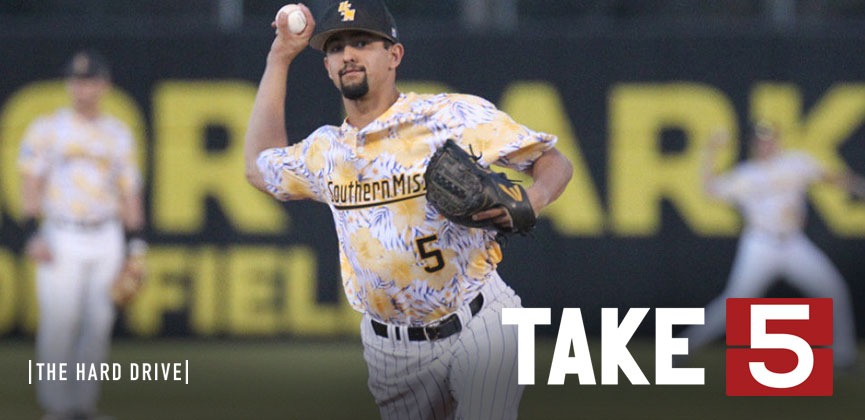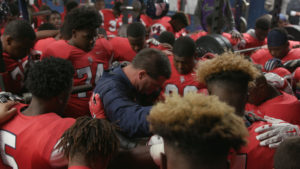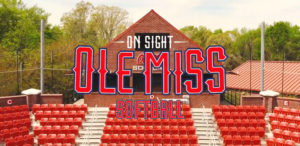The award for Mississippi’s top college baseball player is a big deal. Let’s “Take Five” on college baseball in the state, the legacy of the award, and why this year’s vote is harder than ever.
1 BASEBALL matters HERE
Mississippi does a few important things really well: music, food, and football chiefly among them.
College baseball isn’t far behind. You can measure the health of a sport or program by the number of people and dollars invested in it. In Mississippi, college baseball is big business. A look across the state on a sunny spring Saturday sees a total scene unrivaled in the sport.
The state’s big three programs draw and win big. First the crowds: a year ago, Ole Miss and Mississippi State ranked 2nd & 3rd nationally in total attendance. Southern Miss checked in at No.19.State holds the top twelve NCAA single game crowds in history at famed Dudy Noble Field, newly refurbished for $55 million dollars. The Rebels are set to finish 2nd in attendance for a third straight season. Swayze Field is home to, among other treats, college baseball’s most inspiring tradition: the home run beer shower. (Don’t @ me, just watch.) Southern Miss is a national player the way it just can’t be in football — the ranking was 65 spots higher than their five-year average in football (84th). From sparkling Pete Taylor Park, head coach Scott Berry has built the flagship program in Conference USA.
All three have hosted regionals and been to the College World Series in the last decade. Two are currently ranked in the Top 10. Each has alums who star on Major League Baseball diamonds.
Mississippi is more than a college baseball hot-bed – it’s heaven. And that’s not even counting the storied Division Two program at Delta State, SWAC power Jackson State, and the talent-rich Mississippi JUCO league.
That’s why the Boo Ferriss Trophy, awarded annually to the state’s top player, is important. Ferriss (1921-2016) starred for the Boston Red Sox from 1945-1950 and spent a lifetime of baseball in Mississippi, is said to embody the state’s baseball spirit. But this year’s emerging field has created some hot-take debate about the selection process for the award that bears his name.
2 FERRISS: history, legacy
A quick look at the history of Ferriss Trophy winners, first awarded in 2004:
– MLB All Star Drew Pomeranz (Ole Miss), who won 17 games last year for the Boston Red Sox, took home the award in 2010.
– Two rising National League stars, Chris Stratton (San Francisco Giants) and Hunter Renfroe (San Diego Padres), claimed the trophy for Mississippi State consecutively in 2013-14.
– Last year’s winner, Brent Rooker, became the second player in history to win the SEC triple crown – joining fellow Bulldog Rafael Palmeiro (1984).
Not bad class and company. The list of finalists reads the same.
Minnesota Twins star second baseman Brian Dozier (Southern Miss) was nominated in 2009. He won a Gold Glove last year and is the second American League second baseman to hit 40 home runs. Former Reds All Star shortstop Zach Cozart (Los Angeles) was a finalist from Ole Miss in 2007.
Countless other greats, who for all of baseball’s reasons haven’t become big league stars, round out the list. A few names still ring out in Mississippi like old minus-seven aluminum bats: Ed Easley, Stephen Head, Scott Bittle.
State leads the way with six winners, Ole Miss five, Southern two, and Belhaven one (IF/P Craig Wescott in 2009). Delta State has never had a winner – ironic, since the man who built the great Statesman program from the Delta dirt is the same man on the trophy.
3 THE SELECTION DILEMMA
Which brings us to the recurring selection dilemma. How do you compare guys playing at such different levels of college baseball?
Belhaven, for example, is a Division Three school. Delta State excels in Division Two. Jackson State is among the smallest schools in Division One. Meanwhile, State and Ole Miss play in the most intense, talent-rich league in college baseball. The big schools recruit from a vastly superior talent pool than the other state schools. Most everyone plays much different competition.
And what is the actual criteria for the award?
The language in award press releases and news articles states that the award is given “to the state’s best player.” But is it really a question of evaluating “the best player”? That’s what the Draft is for. There the big three win the day, every day, and it’s not close.
The Ferriss Trophy selection should be about production: who is having the best season right now. Only it’s not that simple, and wouldn’t work that way even if it was.
The Ferriss dilemma isn’t that different from the Heisman Trophy or NBA MVP voting. How do you compare a dual-threat quarterback in a weaker conference with a dominant running back in a major league? Take Mississippi’s own Steve McNair, who set the NCAA yardage record at Alcorn State in 1994 but finished 3rd in the Heisman voting to Rashaan Salaam (Colorado) and Ki Jana Carter (Penn State). Because “Air McNair” played at tiny 1-AA Alcorn, he never had a shot at the award. But we all know who the “best player” was in that group.
What about a leading point guard versus a dominant big man in basketball? If valuable is the operative word, why doesn’t LeBron James win the MVP every single year?
There’s no vivid answer because there’s no clear criteria to quantify “the best” – especially when competition varies. We have precedents, key words like valuable, even metrics like “wins above replacement.” But there’s no scorecard in handing out awards, and you can’t separate a player from his competition.
We often derisively refer to postseason award selections as “popularity contests.” The truth is they are really just a matter of perspective, precedent, and sometimes good-ole-fashioned debate.
4 SANDLIN AND SHANNON
This year’s Ferriss frontrunners present both parts of the selection dilemma: how to judge a pitcher versus a hitter, and how to compare a season in Division Two versus high-level Division One?
Southern Miss pitcher Nick Sandlin is on the best run since Henry Rowengartner fell on the baseball. He threw his second straight shutout last Friday and hasn’t allowed an earned run in 32 innings. Belhaven slugger Zack Shannon must look to like Heddo up there. The repeat GSC player of the year and Golden Spikes Award nominee leads college baseball in every imaginable power category.
Sandlin has pitched Southern to a Top 10 national ranking. Shannon’s Statesmen are ranked No.1 in Division Two. Either would be a sure winner in most years, even amongst the best from the big, bad SEC schools.
- Sandlin’s line: 72 IP, 7-0, 0.88 ERA, 106 K’s, 10 BB, .153 OBA, 13.25 K/ 9
- Shannon’s line: 48 GP, .431 AVG, 28 HR, 84 RBI, 70 R, 33 BB, 24 SO, .994 SLG
How can you not give it to Sandlin, arguably the best pitcher in college baseball, a surefire All-American on a national top 10 team?
But how could you deny Shannon, the goddamn Babe Ruth of Division Two? As ESPN The Zone’s Jay White joked, why even bother showing up anymore if that season doesn’t get it done?
If Schmidt’s three seasons and Shannon’s two seasons aren’t worth ONE player of the year award, I’d stop attending the events, if I were Delta State. At that point, you’re wasting my time and money.
— Your ad here (@JayWhiteSports) May 3, 2018
They’re both outstanding players, in every sense of the word. “Shannon and Sandlin” sounds terrific if they want to campaign together. I wish they would — it’s a big dilemma to separate the two looking ahead to the Ferriss Trophy finish line.
5 JAY POWELL HEADLINES
Former big-league reliever Jay Powell (Meridian) headlines this year’s Ferriss ceremony (Monday, May 21 at the Mississippi Sports Hall of Fame and Museum). Powell starred at Mississippi State, pitched eleven seasons in the MLB, and was inducted into the Mississippi Sports Hall of Fame in 2017.
But it’s even money he’ll be introduced as “the winning pitcher in Game 7 of the 1997 World Series for the Florida Marlins.”
Powell is a gracious, thoughtful guy who probably gets asked about that game every other day. But he seems to enjoy revisiting it in our various talks. Who wouldn’t?
It’s nirvana for a 1990’s baseball nerd like me to go down the wormhole with Powell, who doubled up feared Cleveland Indians slugger Jim Thome on “the best sinker I ever threw” to end the top half of the 11th inning of Game 7. He stormed back on the field just minutes later, when Edgar Renteria brought home Craig Counsell and the first World Series title to Florida.
Powell’s career ultimately saw eleven years, six teams, three playoff appearances, a 36-23 record & 4.17 career E.R.A. and more than thirteen million dollars earned as a special reliever in an era before guys were paid to be relief specialists.
He is a no-brainer choice to speak at the event. Sandlin is the likely choice for the trophy, and hopefully the Statesmen will come back. But it will be a time to celebrate the standout college baseball in Mississippi – even if the selection process for its top award has some kinks.
[pexcirclecta pex_attr_small_title=”” pex_attr_title=”Like this article?” pex_attr_button_text=”See More Take 5 ” pex_attr_button_link=”http://www.bashbrothersmedia.com/category/take-5/” pex_attr_button_link_open=”same” pex_attr_button_color=”333″][/pexcirclecta]
Jon Wiener is a sports broadcaster, writer and film producer with Bash Brothers Media and ESPN 105.9 FM The Zone (Jackson, Miss.). He’s written for The New York Daily News, SLAM! Magazine, ABC News, Global Golf Post, The Jackson Free Press, Mississippi Sports Magazine, and more. He graduated from Syracuse University with an M.S. in Broadcast and Digital Journalism and Trinity University with a B.A. in English Literature. Broadcasting is fun, producing is expensive, writing is where the heart is.











